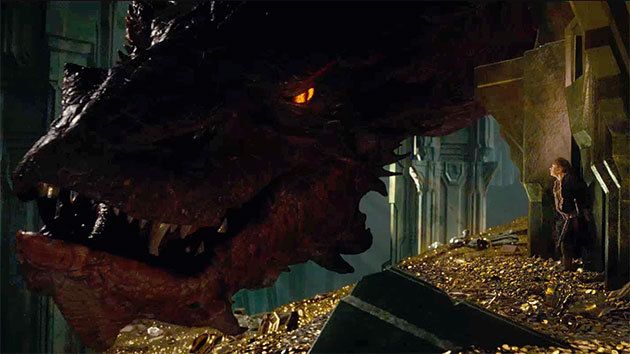
Previously I have discussed villainy in terms of how we relate to and perceive various villains. I’ve praised villains who achieve their aims through intelligence, charm, and guile. These traits tend to appear in villains who are not necessarily a physical match for their heroic counterparts, doing their dirty work through henchmen or other means. Usually, a villain who is smart, playful, and erudite is not an overwhelming physical presence that inspires awe without necessarily having to say a word.
Usually, that villain is not a dragon.
I’ll go into detail about The Hobbit: The Desolation of Smaug tomorrow, but after a few days of reflection on the film, I’ve come to the conclusion that, whatever else might be said about it, they pretty much nailed the ideal portrayal of the ancient magical beast. As impressive as the effects are that brought him to titanic, fire-breathing life, I’m more over the moon regarding the way in which his personality, perspective, and above all, his flaws have been transcribed from page to screen.
One of the first impressions we get is that Smaug likes to play with his food. Or at least, his curiosity overwhelms your typical violent response to intrusion. He is so massive and deadly, and Bilbo so small and insignificant (relatively speaking), that he could easily devour or eviscerate the hobbit at any time. However, he engages the thief in conversation. He learns more about this tiny burglar, and we in turn learn more about him. This is not anything like Bilbo and Gollum swapping riddles. There, we had a sense that the two of them were counterparts, diametrically opposed but somewhat equal. Here, the dread is palpable and ever-present, even as Smaug speaks in almost dulcet tones.
Being a creature that can fly, Smaug sees other beings as beneath him. He is so well-armed for devastation, and so capable of escape and endurance, that he really has no real sense of fear. He speaks and moves boldly. His speed belies his size and makes him all the more intimidating. All of this is conveyed through excellent effects in the film, matching well with our imaginations regarding how dragons should behave. The highlight of Jackson & Weta’s execution of Smaug, however, has got to be his flaws.
With that perspective comes a haughtiness, an arrogance, that blinds Smaug to the threats ‘lesser beings’ could present. From the dwarves of Erebor to the people of Laketown, he never once considers that his centuries-long life could be in danger. Most of all, Smaug is greedy. All of his treasure is HIS treasure, and he won’t part with a single coin of it. Dragons tend to have an instinctual draw towards shiny piles of treasure, which is somewhat odd for creatures of intelligence and articulation, but it’s worth considering that human beings can have similar instincts towards things of little consequence to overall life that still brings them joy, like football paraphernalia or Magic cards or cats.
What other dragons in literature would you like to see executed the way we have seen Smaug?



Leave a Reply